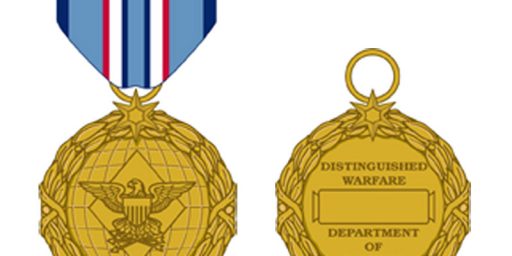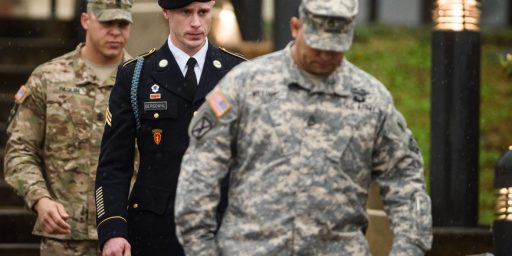Why Are Victims Our Only War Heroes?
Boatswainsn the current Proceedings, Naval Reserve Captain Roger Lee Crossland makes an interesting point:
Thus far, we have overlooked perhaps the most important image in our arsenal, that of the hero in war, and of his or her determination. It is an image we have failed to present adequately in our prosecution of this war. In earlier times, the American public could recite names such as Boatswain̢۪s Mate Reuben James, Lieutenant William Cushing, Colonel Joshua Chamberlain, Sergeant Alvin York, Mess Attendant Dorie Miller, and Sergeant Audie Murphy as easily as they could their own home addresses. The individual heroes of the armed forces in Iraq and Afghanistan, however, generally are unknown. Deluged by lengthy, detailed stories of the extreme efforts taken by terrorists, we have heard little of the extreme efforts taken by members of the U.S. armed forces.
We help our enemies by default, by allowing lesser images to be presented as substitutes. Everyone knows the name Jessica Lynch. She wore her country’€™s uniform, went willingly to her duty in Iraq, and suffered grievous injuries, but does she qualify to be known first among those who served in this war? We have brushed aside battlefield resolution and action–which should be foremost–€”and allowed the image of victimization and suffering to take its place.
For some today, the only image they know is of U.S. servicemen and women as victims. That is not right. It cannot continue. Worse still, we risk having our children’s perception become that signing up to serve is signing up to become a victim.
Much of this is an artifact of 24-hour news television and historically low casualty rates. In WWII or Vietnam, we’d never have heard the name of a truck driver who’d received injuries from a vehicle accident because there were so many soldiers dying under heroic circumstances. Indeed, one essentially had to earn the Medal of Honor or become an aviation ace to get much news attention for one’s soldiering exploits. We lost more soldiers in the first wave at Normandy than during the entirety of the Iraq War to date. In Iraq, each and every dead soldier is a personal human interest story.
Crossland provides a somewhat different explanation:
Another factor surely at work is that victims are easier to identify and celebrate than heroes. They are less controversial. They inspire sympathy. They can be identified using fairly objective standards. It is their status rather than their acts or intentions that define them. Clearly, we need to know their stories, but we should give greater attention to the heroes of war. Substituting victims for heroes, the media have cheapened the concept of heroism. They have sent it into obscurity.
***
Heroism, by definition, implies a superior quality for a moment in time. A hero, therefore, is a superior individual by virtue of superior conduct, and the politically correct will not countenance that. No one is superior to anyone else, nothing is better than anything else, no cause is greater than any other. The United States is not exceptional, nor are U.S. causes. Victims, on the other hand, are perfectly politically correct.
I’m afraid there’s something to this.






I’m afraid you are right.
About 9-10 months ago (just after Baghdad fell) I wrote an essay for a print publication that I called “Where are the heros?”
I was highly annoyed that we have none from this war. All we have are victims and war criminals. (If a U.S. soldier does the slightest thing wrong they will report on him, but never on a hero.) Not only did the embeds go out of their way to not mention heros from this war, as soon as Jessica Lynch *might* have been call a hero, many in the media jumped on the story with both feet to drag her image down well before any of the facts were known.
I think it goes beyond PC but maybe that is just me.
Very interesting post and a much deeper question than it might appear at first glance. Heroes were skillfully fabricated by unified-media in Nazi Germany and Stalin’s Russia (far more so than in the Allied camp) – a hero ceases to be an individual and becomes an icon. An icon for what?
Curiously enough Jessica Lynch stands for a victim. A wounded girl-soldier rescued from a hostile hospital. A hero in the above sense would rather stand for a super-human effort. Either a tragic hero or a triumphant one – Ivan perished while stopping a whole tank division; Fritz blew up a thousand Ivans from one single tank.
Political Correctness (I call it PolCor)is just an off-shot of basic individualism proper to our society as we know it today. The only thing that could overturn that would be a truly immense disaster – a WWIII if you will. Then perhaps we’d want bigger-than-nature heroes to hold on to. And a cause to fight for with no sparing of life.
Another interesting thing is that this post about heroes stands in such a close vicinity to a post about whether a foetus constitutes human life (read: individual) or not. That’s telling too 🙂